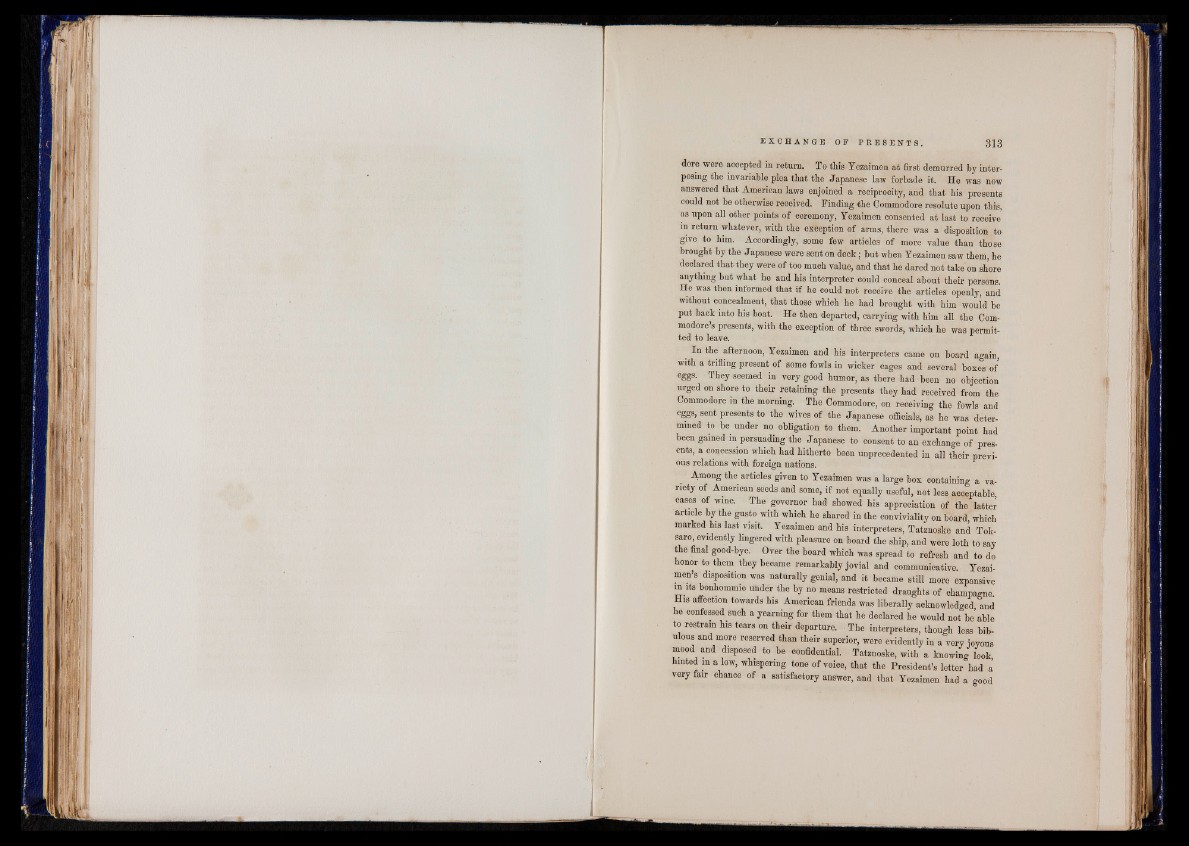
E X C H A N G E 0 Ï P R E S E N T S . 313
dore were accepted in return. To this Yezaimen at first demurred by interposing
the invariable plea that the Japanese law forbade it. He was now
answered that American laws enjoined a reciprocity, and that his presents
could not be otherwise received. Finding the Commodore resolute upon this,
as upon all other points of ceremony, Yezaimen consented at last to receive
in return whatever, with the exception of arms, there was a disposition to
give to him. Accordingly, some few articles of more value than those
brought by the Japanese were sent on deck; but when Yezaimen saw them, he
declared that they were of too much value, and that he dared not take on shore
anything but what he and his interpreter could conceal about their persons.
He was then informed that if he could not receive the articles openly, and
without concealment, that those which he had brought with him would be
put back into his boat. He then departed, carrying with him all the Commodore’s
presents, with the exception of three swords, which he was permit-
ted to leave.
In the afternoon, Yezaimen and his interpreters came on board again,
with a trifling present of some fowls in wicker cages and several boxes of
eggs. They seemed in very good humor, as there had been no objection
urged on shore to their retaining the presents they had received from the
Commodore in the morning. The Commodore, on receiving the fowls and
eggs, sent presents to the wives of the Japanese officials, as he was determined
to be under no obligation to them. Another important point had
been gained in persuading the Japanese to consent to an exchange of presents,
a concession which had hitherto been unprecedented in all their previ-
ous relations with foreign nations.
Among the articles given to Yezaimen was a large box containing a variety
of American seeds and some, if not equally useful, not less acceptable
eases of wine. The governor had showed his appreciation of the latter
article by the gusto with which he shared in the conviviality on board, which
marked his last visit. Yezaimen and his interpreters, Tatznoske and Tok-
saro, evidently fingered with pleasure on board the ship, and were loth to say
the final good-bye. Over the board which was spread to refresh and to do
honor to them they became remarkably jovial and communicative. Yezai-
men’s disposition was naturally genial, and it became still more expansive
m its bonhommie under the by no means restricted draughts of champagne.
His affection towards his American friends was liberally acknowledged and
he confessed such a yearning for them that he declared he would not be able
to restrain his tears on their departure. The interpreters, though less bibulous
and more reserved than their superior, were evidently in a very joyous
mood and disposed to be confidential. Tatznoske, with a knowing look
hinted in a low, whispering tone of voice, that the President’s letter had a
very fair chance of a satisfactory answer, and that Yezaimen had a good